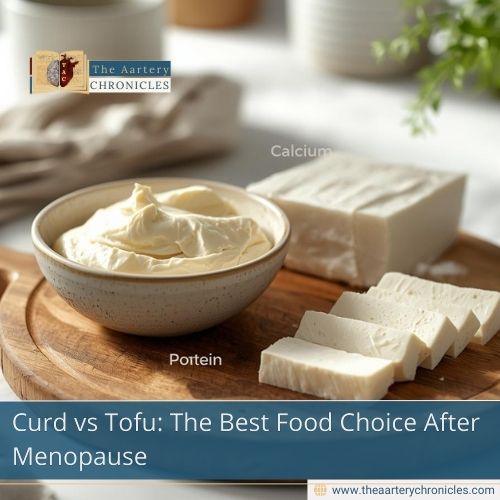

Curd vs Tofu: The Best Food Choice After Menopause
As women move into the post-menopausal stage, diet becomes a major factor in maintaining long-term health. Questions around curd vs. tofu for post-menopause nutrition have become especially common, mainly because this life phase brings changes in bone strength, metabolism, hormones, and digestion. While curd is a fermented dairy food and tofu is a soy-based protein, both provide unique benefits that can support overall well-being. Understanding how each works can help women decide whether to include one or both in their daily meals.
Which Supports Stronger Bones After Menopause?
Bone protection becomes increasingly important after menopause due to declining estrogen levels.
Curd naturally contains calcium, phosphorus, magnesium, and high-quality protein nutrients that help maintain bone mineral density. Because curd is fermented, the acidic environment improves calcium absorption, making the minerals easier for the body to use. Research published in Advances in Nutrition shows that fermented dairy foods are linked with better bone density and lower fracture risk in post-menopausal women.
Tofu, on the other hand, supports bone health through two mechanisms. First, tofu made with calcium salts (like calcium sulfate) can offer calcium levels similar to dairy. Second, tofu provides soy isoflavones, plant compounds that act like very mild estrogen. Studies show these compounds help slow bone loss and may stimulate new bone formation. Together, calcium and isoflavones make tofu a strong contender for bone support.
Can Tofu Play a Special Role?
One advantage tofu has over curd is its isoflavone content. These natural phytoestrogens, such as genistein and daidzein, can attach to estrogen receptors in the body. While their effect is milder than hormone therapy, they may help reduce markers of bone turnover and provide slight relief from symptoms like hot flashes in some women.
Curd does not influence hormones directly, as it does not contain phytoestrogens. However, its high mineral content and quality protein still contribute to metabolic and skeletal health. Therefore, while curd does not mimic estrogen, it remains a valuable nutrient-dense food for daily intake.
Does Curd Have an Edge?
Digestive patterns often shift after menopause, and this is where curd clearly shines.
Curd contains live probiotic cultures that help maintain a healthy gut microbiome, support regular bowel movements, and improve mineral absorption. A stronger gut environment can also boost immunity and enhance nutrient utilization, an important factor as the digestive system becomes less efficient with age.
Tofu, unlike curd, is not fermented and does not supply probiotics. However, it is a good choice for women who are lactose intolerant, a condition that may develop or worsen later in life. Because it is soft, mild, and easy to digest, tofu helps women meet their protein needs without causing dairy-related discomfort.
Which Option Supports Better Cardiovascular Wellness?
After menopause, heart health becomes a major concern.
Tofu provides a complete plant protein that is free of cholesterol. Its isoflavones and other soy compounds have been linked with improved lipid profiles, including lower LDL (bad) cholesterol. This may help reduce the risk of cardiovascular disease over time.
Curd from whole milk contains saturated fat, which may raise cholesterol levels if eaten in excess. However, choosing low-fat or skimmed curd reduces this concern significantly. In its lighter form, curd still offers high-quality protein and minerals that support overall metabolic balance and healthy weight management, both crucial for heart health.
Conclusion
When deciding between curd vs. tofu for post-menopause nutrition, it helps to consider personal priorities:
- Choose curd if you want strong gut support, enhanced mineral absorption, and a convenient source of calcium and protein. Opt for low-fat curd for heart health.
- Choose tofu if you want plant-based protein, mild hormonal support from isoflavones, and a cholesterol-free option that supports cardiovascular wellness.
- Choose both if you want to maximise overall benefits. Many women include curd for digestion and minerals while relying on tofu for plant protein and estrogen-like effects.
By combining both foods, post-menopausal women can support bone strength, hormonal balance, gut health, and heart wellness through simple dietary choices.
Source: Inputs from various media Sources
I’m a pharmacist with a strong background in health sciences. I hold a BSc from Delhi University and a pharmacy degree from PDM University. I write articles and daily health news while interviewing doctors to bring you the latest insights. In my free time, you’ll find me at the gym or lost in a sci-fi novel.
- Priya Bairagi
- Health News and Updates,People Forum
- 24 November 2025
- 13:00








